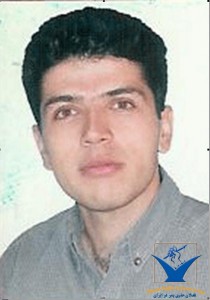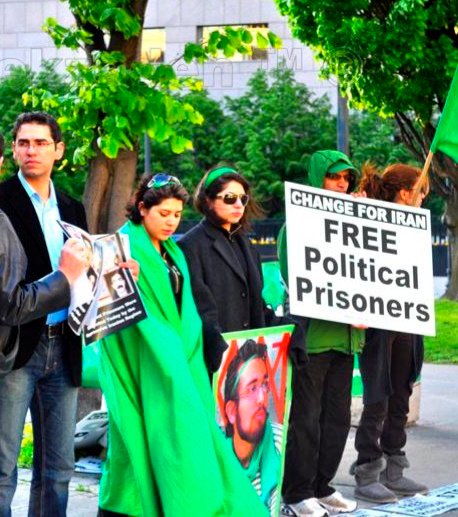The Latest from Iran (30 May): Pressure, Counter-Pressure, & a Letter from Majid Tavakoli
 Sunday, May 30, 2010 at 18:05
Sunday, May 30, 2010 at 18:05  1800 GMT: Academic Corner. HRANA reports that 15 students at Shahid Beheshti University have been suspended for criticism of the Supreme Leader.
1800 GMT: Academic Corner. HRANA reports that 15 students at Shahid Beheshti University have been suspended for criticism of the Supreme Leader.1755 GMT: Political Prisoner Watch. The sentence of Zia Nabavi, a member of the Right to Education Council, has been reduced to 10 years from 15 years on appeal.
1750 GMT: Economy Watch. Reformist member of Parliament Darius Ghanbari has warned that if disinvestment, excessive imports and loss of domestic production continue, Iran will have 60 million (out of a population of 75+ million) below the poverty line. MP Nasrullah Torabi has called on the Government to be "accountable" to the 40 million he says are already below that line.
NEW Iran Report: The Fight on the Cultural Front (Erdbrink)
Iran Document: Mousavi “Greens Will Not be Stopped by Arrests, Prisons, or Killing”
Iran: A Poem for Executed Teacher Farzad Kamangar
The Latest from Iran (29 May): Statements for 22 Khordad/12 June
1745 GMT: A Clerical Slapdown. Ayatollah Amini, the leader of Friday Prayers in Qom, asked yesterday, "How is it possible to administer for the underprivileged with temporary relief?"
Amini leveled the allegation at the Government that Ayatollah Khomeini's ideas were not considered by persons in charge. Noting that other underdeveloped countries have managed to overcome their difficulties within 30 years. he said an adequate plan should have been established to create work, to develop the cities, and to support universities.
1735 GMT: Political Prisoner Watch --- Inside Version (cont.). Human Rights Activists News Agency carries a story on the alleged aftermath of two videos, released by the agency earlier this week, with accounts of torture and rape by detainees who were in Rajaiee Shahr Prison.
On Saturday, two agents from the Intelligence Ministry transferred twenty prisoners to the Security Office in Rajaiee Shahr prison where they were interrogated and threatened. They also moved Mohsen Beikvand, the victim in one of the videos, to solitary confinement. Unknown men reportedly contacted Bahram Tasviri, the other victim from the videos, and told him that his image and reputation have been shattered outside of prison with the publication of these videos.
(Note: we have not posted the video, which is available in the HRANA story, because we feel it is vital to confirm the authenticity of the story given the serious allegations. Feedback from those who view the video is welcomed.)
1730 GMT: Political Prisoner Watch --- Inside Version. We return from a break to find a purported account of conditions at Evin Prison from detained journalist and filmmaker Mohammad Nourizad. The account includes Nourizad's meeting last week with Tehran Prosecutor General Abbas Jafari Dowlatabadi, who allegedly promised Nourizad's release if the political prisoner and his family gave no statements to the media.
Nourizad, in the letter to the Supreme Leader, calls Evin "the second Kahrizak", a reference to the notorious facility that was closed by Ayatollah Khamenei after revelations of abuses and killings of detainees.
0855 GMT: Earthquake Alarm! Khabar Online reports that women have been seen taking off their hijab, allegedly for sporting activities, in several parks and public spaces in Tehran.
0850 GMT: Political Prisoner Watch. Bahram Chagini, a university student and a member of the Mousavi presidential campaign, was reportedly arrested by intelligence agents in Arak in mid-May.
0840 GMT: Another Political Prisoner List. Rah-e-Sabz has published another set of names and details of 100 political prisoners in Block 350 of Evin Prison. About 70% are students.
There is one additional name of a journalist, Khashayar Jahanzad Farrokhi, to add to our running total. We estimate that 93 journalists remain in detention or are under threat of heavy bails.
0835 GMT: And Another Cleric is Summoned. Rah-e-Sabz reports that Ahmad Montazeri, the son of the late Grand Ayatollah Montazeri, has been summoned to and interrogated in a special clerical court.
0830 GMT: Cleric Responds to "Lies". Ayatollah Sane'i has expressed his regret, "Five years ago I said lies were spreading, but I didn't know they were to become a culture."
0820 GMT: Reformist Responds to "Lies". We reported on Friday about Islamic Republic of Iran Broadcasting's distortion of the words of reformist activist Fatemeh Haghighatjoo, turning her into a traitor declaring, "Do not accept Iran."
Haghighatjoo has now threatened to file a lawsuit against IRIB and the Supreme Leader, as the head of the broadcaster. She explained that the Green Movement, with its initial slogan "Where is My Vote?", did not want regime change; however, after killings and imprisonments, many doubted that reforms could occur within the system. Haghighatjoo concluded, "I believe that the Constitution must be replaced by a secular system."
0815 GMT: Rafsanjani Watch. Hashemi Rafsanjani's daughter Faezeh Hasemi has responded to the attack on her office with an unsubtle swipe at the Government. This was not carried by common thieves; it was like a "Mongols attack" to incite terror.
0805 GMT: Parliamentary Moves. Following this week's election of leaders in Parliament, with one Deputy Speaker (Sadr) seen as pro-Ahmadinejad and another (Bahonar) criticised by "hardliners" --- Speaker Ali Larijani and his allies are pushing the line of "Parliamentary unity".
Larijani, quoted by his supporting website Khabar Online, declared that political divisions are not compatible with the Supreme Leader's ideas. Elyas Naderan, a leading critic of the Ahmadinejad Government, predicted that the "political alignment" of pro-goverment and anti-government factions will not persist.
Not all proceeded smoothly for Larijani's move, however: his press conference started 20 minutes late, suffered a blackout, and was suddenly cut off.
0800 GMT: Political Prisoner Watch. The scholars of the Middle East Studies Association have written to the Supreme Leader, calling for the release of Majid Tavakoli (see 0645 GMT) and other political prisoners.
0700 GMT: The Cultural Front. We have posted, in a separate entry, a report from Thomas Erdbrink, the Washington Post correspondent in Tehran, on cultural resistance to the Iranian regime.
0645 GMT: A Letter from Tavakoli? There was a lot of chatter yesterday about a purported message from Majid Tavakoli, the detained student leader.
The letter has not been translated into English, but an EA reader wanted to get a sense of Tavakoli's analysis and objectives. So, over to EA correspondent Ms Zahra:
Tavakoli's statement reads like a mix of [prominent Iranian expatriate opposition figure] Mohsen Sazegara's daily lessons about non-violent struggle, parts of Mousavi's statements (esteqamat, perseverance), and expatriate demands for an end to the Islamic Republic.
As I never heard more than short statements by him, no idea if he is the author. If it is not by him, it could be a collective text, written by a reformist theoretician in prison --- I doubt this, however, because in my opinion reformists would never give up the Islamic Republic. It could also be the result of discussions in prison about future strategies for the Green Movement. In any case the phrasing is coherent, i.e., written by a single person.
An excellent text, insisting on the positiveness of the leaders, necessity of positive criticism, unity, fundamental demands like individual freedom and pluralism (to prevent a new dictatorship), clearly defined goals, and strategies of non-violence, along the lines of those set out by the scholar Gene Sharp.
It could also be an implicit reminder to Mousavi and Karroubi to be more definitive in their demands, but it is only advice and does not condemn them.
0630 GMT: We return from a Saturday night break to assess this morning's political situation, five days before the anniversary of the death of Ayatollah Khomeini and less than two weeks before the birthday of the 2009 election.
The regime made a big political move with the announcement that the Supreme Leader, introduced by President Ahmadinejad, will lead Tehran Friday Prayers from Khomeini's mausoleum. Can't be much clearer than this in a bid for legitimacy.
It's the first major regime rally since 22 Bahman (11 February), with Ayatollah Khamenei speaking at Friday Prayers for the first time since 19 June, when he reaffirmed Ahmadinejad's victory, warned the opposition not to challenge, and tried to keep Hashemi Rafsanjani in the fold.
So what were those various actors doing yesterday? Well, opposition figure Mir Hossein Mousavi had made another challenge with his statement to former political prisoners (again, can't get much more pointed in the symbolism than talking with those who had been unjustly detained under the Shah), and reformist groups and activists --- despite the Government's attempt to silence them --- continued to put out declarations of intent before 12 June.
Even more interesting, however, were the manoeuvres around Rafsanjani. The former President's website issued its own response to the Government by re-issuing Rafsanjani's criticisms of President Ahmadinejad and the Iranian system, both in a letter to the Supreme Leader before the election and in Rafsanjani's 17 July Friday Prayer address (the last time he took the podium).
But the regime was putting out its own message for Rafsanjani this weekend: the office of his daughter Faezeh Hashemi was raided, soon after security forces moved upon the campus of Islamic Azad University --- established by the Rafsanjani Government and led until recently by Rafsanjani's son Mehdi Hashemi --- and seized computers and documents.
What does it all mean? Well, at this point I'll take the easy way out: too soon to tell....
 Ahmad Montazeri,
Ahmad Montazeri,  Ali Larijani,
Ali Larijani,  Ayatollah Ali Khamenei,
Ayatollah Ali Khamenei,  Ayatollah Hossein-Ali Montazeri,
Ayatollah Hossein-Ali Montazeri,  Ayatollah Ruhollah Khomeini,
Ayatollah Ruhollah Khomeini,  Ayatollah Yusuf Sane'i,
Ayatollah Yusuf Sane'i,  Bahram Chagini,
Bahram Chagini,  Bahram Tasviri,
Bahram Tasviri,  Darius Ghanbari,
Darius Ghanbari,  Elyas Naderan,
Elyas Naderan,  Faezeh Hashemi,
Faezeh Hashemi,  Fatemeh Haghighatjoo,
Fatemeh Haghighatjoo,  Gene Sharp,
Gene Sharp,  Hashemi Rafsanjani,
Hashemi Rafsanjani,  Human Rights Activists News Agency,
Human Rights Activists News Agency,  Iran,
Iran,  Iran Elections 2009,
Iran Elections 2009,  Islamic Republic of Iran Broadcasting,
Islamic Republic of Iran Broadcasting,  Khabar Online,
Khabar Online,  Khashayar Jahanzad Farrokhi,
Khashayar Jahanzad Farrokhi,  Mahmoud Ahmadinejad,
Mahmoud Ahmadinejad,  Majid Tavakoli,
Majid Tavakoli,  Mehdi Hashemi,
Mehdi Hashemi,  Mehdi Karroubi,
Mehdi Karroubi,  Middle East Studies Association,
Middle East Studies Association,  Mir Hossein Mousavi,
Mir Hossein Mousavi,  Mohammad Nourizad,
Mohammad Nourizad,  Mohsen Beikvand,
Mohsen Beikvand,  Ms Zahra,
Ms Zahra,  Nasrullah Torabi,
Nasrullah Torabi,  Rah-e-Sabz,
Rah-e-Sabz,  Rajaiee Shahr Prison,
Rajaiee Shahr Prison,  Thomas Erdbrink,
Thomas Erdbrink,  Washington Post,
Washington Post,  Zia Nabavi in
Zia Nabavi in  Middle East & Iran
Middle East & Iran 



